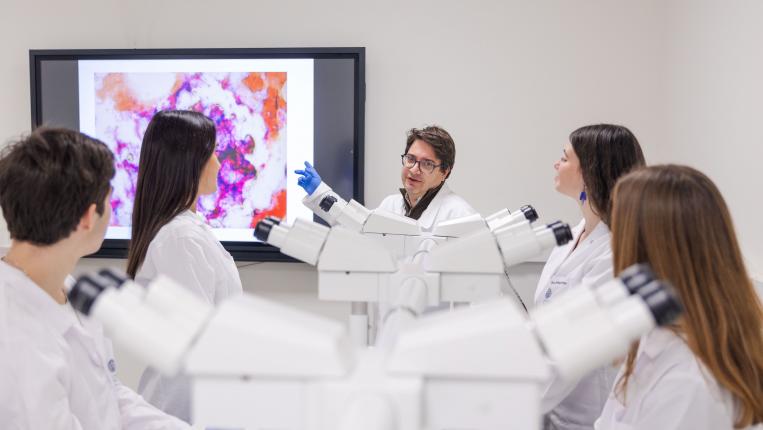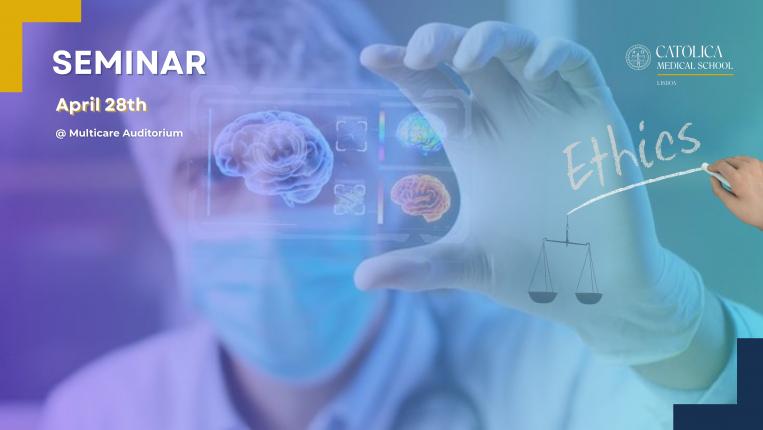The Católica Medical School recognizes that artificial intelligence (AI) is a profoundly transformative technology, which poses legal and ethical challenges both in its use and in the application of its tools. These technologies are being incorporated into digital tools that involve almost all dimensions of human life and society, from the daily lives of citizens to the institutional practices of companies, universities, hospitals, courts, and governments. The application of AI systems is rapidly transforming the healthcare industry, enabling more accurate diagnoses, estimates of clinical treatment success, support in patient care, and advances in clinical research. However, concerns arise related to the use of AI, such as the fabrication of false information, misinformation, gender and racial bias, and the violation of privacy.
A well-founded ethical and legal framework to guide the responsible use of AI in health is essential, as is literacy in this field. The European Union has drafted the AI Act to improve the functioning of the internal market by classifying AI systems based on the risks they pose to citizens' health, safety, or fundamental rights. AI-systems in critical infrastructure are considered to be high-risk and must meet strict requirements before being put into service.
All national and international documents underline the need to empower users to use AI well, for safe use, promoting innovation and research, with ethics and respecting human rights. AI tools should be a tool at the service of people, helping each person to develop their full potential, optimise their time and work, achieve their goals and safeguard their human rights, autonomy and dignity. The Seminar entitled "Artificial Intelligence in Health: Legal Implications and Ethical Reflections" therefore offers this opportunity to seek knowledge, share wisdom and build paths for the beneficial use of AI in health.
Target audience: aimed at students in the 2nd year of the Integrated master’s degree in medicine, Curricular Unit of Health Law, but given its societal relevance, open to the entire academic, scientific, and civil society community.
The objectives of the seminar are:
- To provide students and participants with a comprehensive understanding of the legal issues associated with the use of artificial intelligence (AI) in healthcare, including data privacy, civil liability, and regulation.
- Discuss how current laws can be adapted to keep up with technological advances and ensure the protection of patients and families.
- Encourage critical reflection on the ethical dilemmas that arise with the implementation of AI in health, such as equity in access, transparency of algorithms, and automated decision-making.
- To promote debate on how health professionals can balance technological benefits with medical ethics.
To present and debate these topics we have the presence of experts such as:
| Agostinho Soares Torres | Joaquim Jorge | Francisca Leite | William Hasselberger |
| André Peralta | Francis P. Crawley (on-line) |
Moderator: Mara de Sousa Freitas & Marta Brites
In this seminar we intend to discuss about:
How does the European Union AI Regulation classify AI systems? | What are the requirements for high-risk systems? | What are the main ethical and legal concerns associated with the use of AI in healthcare? | What are the main legal implications of the use of artificial intelligence in healthcare? | How to ensure the transparency and explainability of AI algorithms used in healthcare? | What are the legal and ethical challenges associated with implementing AI in healthcare? | How can AI impact the doctor-patient relationship and clinical decision-making? |What are the best practices for integrating AI into healthcare responsibly and ethically? | How can empathy be applied in the interaction with artificial intelligence systems? | What are the risks of over-reliance on this tool? | How can we ensure that AI respects human values? |What is the main challenge of AI for humanity as a whole?





